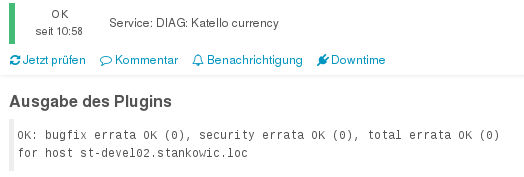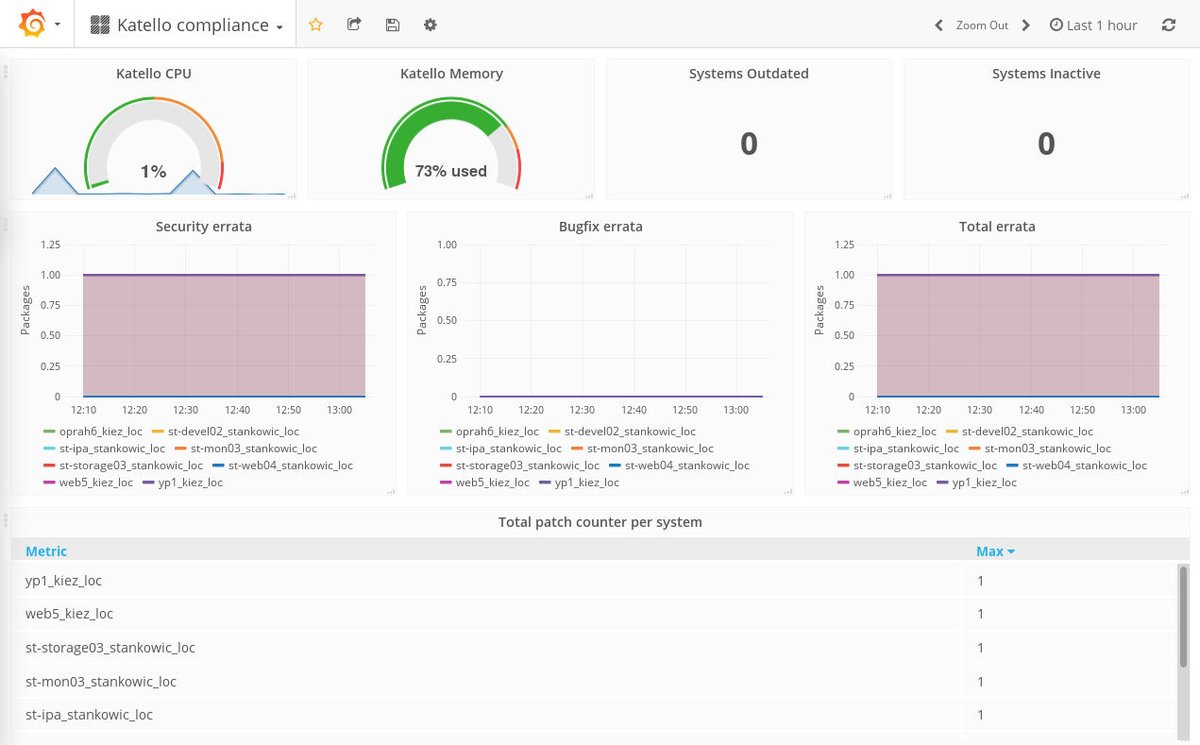check_katello_currency is a Nagios/Icinga plugin for checking patch currency of hosts managed by Foreman/Katello or Red Hat Satellite 6. As it also supports performance data, it can be used along with visualization tools such as Grafana:
The script checks the patch currency of one or multiple systems. The following information are gathered by accesing the Foreman/Katello API:
- Outstanding errata update counter per category:
- bug fix
- security
- total summary
To gather these information a valid username / password combination to your management system is required. The login credentials are prompted when running the script. To automate this you have two options:
The following shell variables are used:
- SATELLITE_LOGIN - a username
- SATELLITE_PASSWORD - the appropriate password
You might also want to set the HISTFILE variable (depending on your shell) to hide the command including the password in the history:
$ HISTFILE="" SATELLITE_LOGIN=mylogin SATELLITE_PASSWORD=mypass ./check_katello_currency.py -S giertz.stankowic.loc
A better possibility is to create a authfile with permisions 0600. Just enter the username in the first line and the password in the second line and hand the path to the script:
$ ./check_katello_currency.py -a giertz.auth -S giertz.stankowic.loc
The plugin requires Python 2.6 or newer - it also requires the requests and simplejson modules.
The plugin requires API version 2 - the script checks the API version and aborts if you are using a historic version of Foreman.
By default, the script checks a particular system or multiple systems for outstanding bugfix and security errata. It is possible to control this behaviour by specifying additional parameters (see below). The script also support performance data for data visualization.
The following parameters can be specified:
| Parameter | Description |
|---|---|
-h / --help |
shows help and quits |
-d / --debug |
enable debugging outputs (default: no) |
-P / --show-perfdata |
enables performance data (default: no) |
-a / --authfile |
defines an auth file to use instead of shell variables |
-s / --server |
defines the server to use (default: localhost) |
--insecure |
Disables SSL verification (default: no) |
-y / --generic-statistics |
checks for inactive and outdated system statistic metrics (default :no) |
-u / --outdated-warning |
defines outdated systems warning percentage threshold (default: 50) |
-U / --outdated-critical |
defines outdated systems critical percentage threshold (default: 80) |
-n / --inactive-warning |
defines inactive systems warning percentage threshold (default: 10) |
-N / --inactive-critical |
defines inactive systems critical percentage threshold (default: 50) |
-S / --system |
defines one or multiple system(s) to check |
-A / --all-systems |
checks all registered systems - USE WITH CAUTION (default: no) |
-x / --exclude |
specifices particular hosts to ignore (default: no) |
-t / --total-warning |
defines total package update warning threshold (default: empty) |
-T / --total-critical |
defines total package update critical threshold (default: empty) |
-i / --important-warning |
defines security package (critical, important and moderate security fixes) update warning threshold (default: 10) |
-I / --important-critical |
defines security package (critical, important and moderate security fixes) update warning threshold (default: 20) |
-b / --bugs-warning |
defines bug package update warning threshold (default: 25) |
-B / --bugs-critical |
defines bug package update warning threshold (default: 50) |
-l / --location |
filters by a particular location (default: no) |
-o / --organization |
filters by a particular organization (default: no) |
-g / --hostgroup |
filters by a particular hostgroup (default: no) |
-e / --environment |
filters by a particular environment (default: no) |
The following example checks a single system on the local Foreman/Katello server:
$ ./check_katello_currency.py -S giertz.stankowic.loc
Satellite Username: admin
Satellite Password:
OK: bugfix errata OK (0), security errata OK (1) for host giertz.stankowic.loc
Checking multiple systems on a remote Foreman/Katello server, authentication using authfile:
$ ./check_katello_currency.py -s st-katello01.stankowic.loc -a katello.auth -S giertz.stankowic.loc -S shittyrobots.test.loc
OK: bugfix errata OK (0), security errata OK (1) for host giertz.stankowic.loc, bugfix errata OK (0), security errata OK (1) for host shittyrobots.test.loc
Checking a single host on a local Foreman/Katello installation, also checking total errata, enabling performance data:
$ ./check_katello_currency.py -S giertz.stankowic.loc -t 1 -T 20 -P
Username: admin
Password:
WARNING: bugfix errata OK (0), security errata OK (1), total errata WARNING (1) for host giertz.stankowic.loc | 'bugfix_errata'=0;25;50;; 'security_errata'=1;10;20;; 'total_errata'=1;1;20;;
When specifying multiple systems along with performance data, the metric names will get prefix according to the particular host:
$ ./check_katello_currency.py -S giertz.stankowic.loc -S shittyrobots.test.loc -a katello.auth -P
OK: bugfix errata OK (0), security errata OK (1) for host giertz.stankowic.loc, bugfix errata OK (0), security errata OK (1) for host shittyrobots.test.loc | 'bugfix_errata_giertz'=0;25;50;; 'security_errata_giertz'=1;10;20;; 'bugfix_errata_shittyrobots'=0;25;50;; 'security_errata_shittyrobots'=1;10;20;;
When checking all systems (which seriously fsckes up readability!) it is possible to filter by location, organization, hostgroup or Puppet environment. Both human-readable names and internal IDs are accepted:
$ ./check_katello_currency.py -s st-katello01.stankowic.loc -a katello.auth -A -g dev-hosts
OK: bugfix errata OK (0), security errata OK (0) for host st-devel02.stankowic.loc, bugfix errata OK (0), security errata OK (0) for host st-web04.stankowic.loc
Checking generic statistics of a Foreman/Katello system:
$ ./check_katello_currency.py -a katello.auth -y -P
OK: outdated systems OK (0), inactive systems OK (0)| 'systems_outdated'=0;;;; 'systems_total'=8;;;; 'systems_inactive'=0;;;;
Just deploy the Python script on your Icinga host or node. This repository also includes a NRPE and Icinga2 configuration. If you're using a RPM-based Linux distro, you can use the RPM spec file to create a RPM pacakge.
I'm using the following snippet to check all the update currency of all Linux VMs:
apply Service "DIAG: Katello currency" {
import "generic-service"
check_command = "check_katello_currency"
vars.katello_perfdata = true
vars.katello_host = "st-katello01.stankowic.loc"
vars.katello_authfile = "/usr/lib64/nagios/plugins/katello.auth"
assign where host.vars.os == "Linux"
ignore where host.vars.app == "katello"
ignore where host.vars.nokatello
ignore where host.vars.noagent
}
Systems running the Foreman/Katello application as well as systems without the Icinga2 agent (or systems with the noagent flag) are ignored.
To check the statistics on Foreman/Katello hosts, you could use the following snippet:
apply Service "DIAG: Katello statistics" {
import "generic-service"
check_command = "check_katello_currency"
vars.katello_stats = true
vars.katello_perfdata = true
assign where host.vars.os == "Linux" && host.vars.app == "katello"
ignore where host.vars.noagent
}
Systems running the Foreman/Katello application (implemented by the vars.app tag) will be checked. The vars.katello_stats flag automatically sets the -y parameter. Make sure the particular host configuration contains an authfile:
object Host "st-katello01.stankowic.loc" {
import "linux-host"
...
vars.app = "katello"
vars.katello_authfile = "/usr/lib64/nagios/plugins/katello.auth"
The authfile needs to have file permissions 0600 and should be owned by the icinga user:
# chmod 0600 /usr/lib64/nagios/plugins/katello.auth
# chown icinga: /usr/lib64/nagios/plugins/katello.auth

